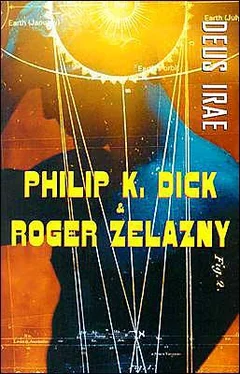“Sure we can hide you,” all three lizards said simultaneously.
“On the other hand,” Tibor said, “a human would not kill another human.” But he knew it was untrue; plenty of humans killed and injured other humans; after all, the giant Smash had been brought on by humans.
The three lizards huddled, conferring. Then, abruptly, they stood up, turned to face Tibor. “Do you have any metal money?” Jackson asked, in a kind of deliberately careless, offhand way.
“None,” Tibor said cautiously. This also was untrue; he had an alloy fifty-cent piece in a secret crevasse of his car.
“I ask that,” Jackson said, “because we have a dog we would be willing to sell you.”
“A what? Tibor said.
“Dog.” Potter and Jackson trooped off, disappearing into the darkness; evidently their vision was enormously improved over human standards.
“Have you never seen a dog?” the remaining lizard asked.
“Yes, but it was a long time ago,” Tibor answered, lying again.
The lizard said, “A dog, your dog, would drive off the other human—that is, if you gave him the proper command. They have to be trained, of course; they’re lower on the evolutionary scale as compared to humans and we alike. They’re not like those double-domed dogs people bred before the Smash.”
Tibor said, “Would a dog be able to find the man I am looking for?”
“What man?”
Tibor showed it the blotched photograph of Carleton Lufteufel.
“You want him?” the lizard said, studying the face. “Is he a neat guy?”
“I can’t say,” Tibor said obliquely.
The lizard handed him back the photograph. “Is there a reward?”
Tibor pondered. “A fifty-cent piece,” he said.
“Really?” The lizard fluffed up his scales excitedly. “Payable dead or alive?”
“He can’t die,” Tibor said.
“Everyone dies.”
“He will not die.”
“Is he—supernatural?”
“Yes.” Tibor nodded.
“I have never seen a supernatural,” the lizard declared; he shook his head firmly. “Not in my entire life.”
“You have a religion, do you?”
““Yes. We worship the dawn.”
“Quaint,” Tibor said.
“When the sun comes,” the lizard said, “evil vanishes from the world. Do you believe there’s life on the sun?”
“It’s too hot,” Tibor said.
“But they could be made out of diamonds.”
Tibor said, “Nothing can live on the sun.”
“How fast does the sun move?”
“About a million miles per hour.”
“It’s bigger than it looks, isn’t it?” The lizard peered at him.
“Much bigger. Almost a billion miles in circumference.”
“Have you been there?” the lizard asked.
“I said,” Tibor said, “No life can exist on the sun. Anyhow, the surface is melted; there wouldn’t be any place to stand.” Who is it following me? he wondered. “A highwayman?” he asked aloud. “The human lurking me—what’s he look like?”
“Young,” the lizard said.
“Pete Sands,” Tibor said flatly.
The two other lizards emerged from the darkness; Potter held a great gray animal who whined passionately when it saw Tibor—a whine of love. Tibor studied it; the dog studied him in return.
“Toby likes you,” Jackson said.
“I would like a dog very much,” Tibor said yearningly. It would be his friend, the way Tom Swift And His Electric Magic Carpet was to Pete. A deep and strange feeling welled up in him, a hope. “Wow,” he said. He sent his front extensors out to grapple gently at the quivering brown mop of fur, the glorious tail wagger. “But are you willing to part with such a fine—”
Jackson said brusquely, “Humans must be protected. It is the law. We knew this from the moment of our births.”
“So they can repopulate back,” Potter said. “With their intact genes.”
“What’s a gene?” Tibor asked.
Potter gestured. “You know. An ingredient in masculine sperm.”
“What’s sperm?” Tibor asked.
They all laughed, but, shyly, did not answer.
“What does this dog eat?” Tibor asked, then.
“Anything,” Jackson said. “He can forage. He is reliant.”
“How long will he live?”
“Oh, probably two to three hundred years.”
Tibor said, “Then he will outlive me.” For some reason this depressed him; all at once he felt weak and cold. I shouldn’t feel this way, he reasoned with himself. Already brought down by thoughts of separation. After all, I’m a human being. At least these lizards think I am; I’m good enough for them. I should feel strength and pride, he thought, and not envision ahead already that terrible end of friendships, for us all.
Suddenly the three lizards whipped about, peering into the darkness, their bodies straining against or toward something invisible.
“What is it?” Tibor said; again he clutched at the pistol concealed on his person.
“Bugs,” Potter said laconically.
“The dumb bastards,” Jackson said.
Bugs, Tibor thought. How horrible. He had heard of them many tunes, them and their multifaceted eyes, their gleaming shells—a weird conglomeration of unhuman parts. And to think that they bred their way out of mammals, he thought, and in such a few short years. Speeded up frantically by the radiation. We’re related to them and they stink. They offend the world. And surely they offend God.
“What are you doing there?” a metallic voice buzzed. Tibor saw them moving, upright; they lurched toward the.light. “Lizzys,” the bug said scathingly. “And—Frebis forbid!—an inc.”
Five bugs stood by the light now, warming their—Christ, Tibor thought. Warming their brittle bodies; if a bug was hit directly in the breadbasket, it broke in half. So much for bugs: they depended mainly on their facile tongues to get them what they wanted. Bugs talked their way out of a good deal of trouble; they were the lie-spinners of Earth.
These were unarmed. As near as he could make out. And, standing by his cart, the three lizards relaxed; their fear had departed.
“Hey, bug,” Jackson said, nodding toward one of the chitin-shelled creatures. “How come you have lungs? Where’d you get them? Vermin shouldn’t have lungs. It’s against nature.”
Potter said, “We ought to cook us up a little bug soup.”
Incredulous, Tibor said, “You mean you eat them?”
“Right,” the third lizard said, his arms folded, leaning against Tiber’s cart. “When times are tough… they taste awful.”
“You rotting obnoxious freak,” one bug said. They did not seem frightened; they made no move in the direction of escape.
“Does your tail come off?” another bug said to the three lizards.
“What tail?” another bug said. “That’s its pecker hanging down behind it. Lizards’ peckers stick out behind, not in front.”
The bugs laughed coarsely.
“I saw this lizard once,” a bug declared, “who had an erection—and he got scared off, I guess her husband came back, and he tried to run, and all the husband had to do was tromp down with his foot on that great hard pecker sticking out behind.” All the bugs laughed; they seemed to be enjoying themselves.
“What happened after he tromped down on it?” a bug asked. “Did it come off then?”
“It came off,” the other bug continued, “and it lay there twitching and flopping in the dirt until sundown.”
Potter said, “Let’s take these insects down a peg or two. Listen to them—they’re uppity.” He glanced around him, apparently seeking something to use as a weapon. He took his tune and the bugs did not move; they seemed relaxed and confident.
And now Tibor saw why. The bugs had not ventured out alone. A score of runners had accompanied them.
Читать дальше








